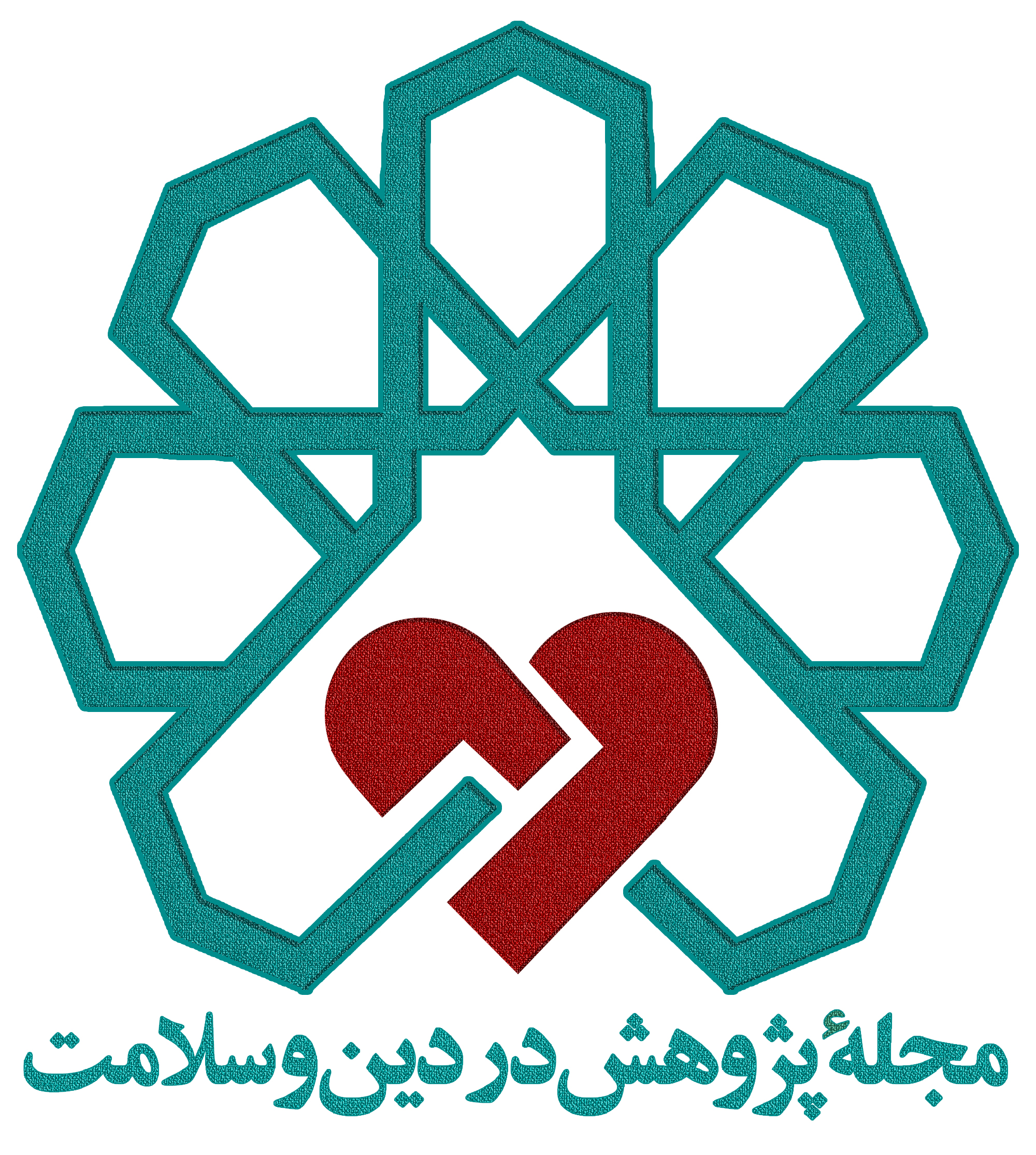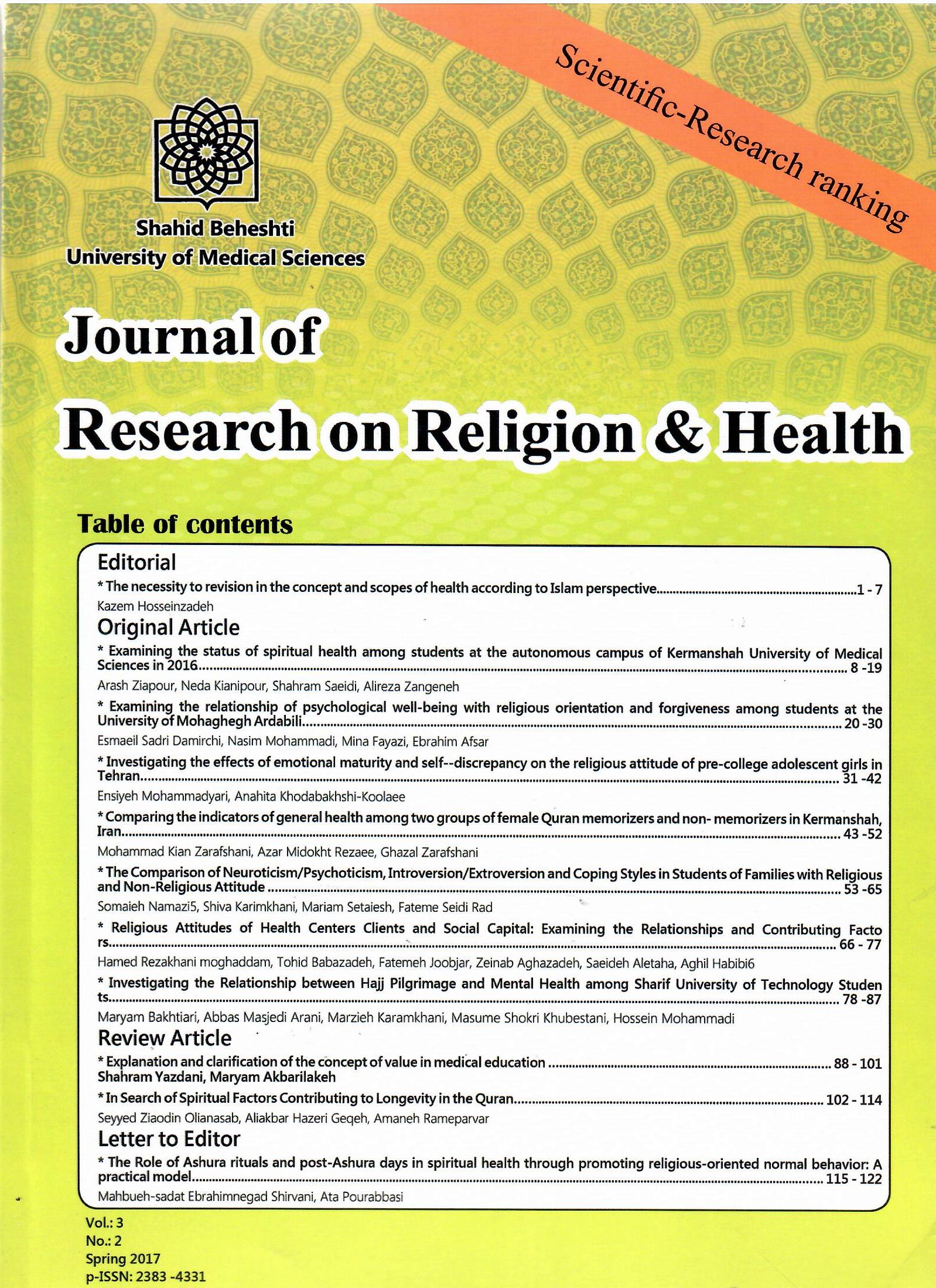بررسی رابطهی بهزیستی روانشناختی با جهتگیری مذهبی و بخشش در دانشجویان دانشگاه محقق اردبیلی
پژوهش در دین و سلامت ,
دوره 3 شماره 2 (2017),
26 February 2017
,
صفحه 20-30
https://doi.org/10.22037/jrrh.v3i2.13551
چکیده
سابقه و هدف: با توجه به ظهور رويكرد مثبتنگر به سلامت رواني در سالهاي اخير، بهزيستي روانشناختي، که معیاری برای رشد استعدادهاي واقعي هر فرد محسوب میشود، توجه مجامع علمي را به خود جلب کرده است؛ به همین دلیل، شناسايي عوامل تأثيرگذار بر آن داراي اهميت اساسي است. ازاینرو، پژوهش حاضر با هدف بررسی ارتباط بهزیستی روانشناختی با جهتگیری مذهبی و بخشش در دانشجویان دانشگاه محقق اردبیلی انجام شده است.
روش کار: این پژوهش از نوع توصیفی- همبستگی؛ و جامعهی آماری شامل همهی دانشجویان دانشگاه محقق اردبیلی در سال 1394 است، که از میان آنان 150 دانشجو (نمونهی پژوهشی) با روش نمونهگیری در دسترس انتخاب شدند. دادهها با استفاده از پرسشنامهی بهزیستی روانشناختی ریف، پرسشنامهی جهتگیری مذهبی آلپورت و مقیاس بخشش والکر و گارسوخ، جمعآوری؛ و با روشهای آمار توصیفی و استنباطی (ضریب همبستگی پیرسون و رگرسیون چندگانه) تحلیل شد. در این پژوهش همهی موارد اخلاقی رعایت شده است. علاوهبراین، نویسندگان مقاله هیچگونه تضاد منافعی گزارش نکردهاند.
یافتهها: یافتههای بهدستآمده نشان داد که بین بهزیستی روانشناختی با جهتگیری مذهبی درونی و بخشش رابطهی مثبت معنادار؛ و همچنین بین بهزیستی روانشناختی و جهتگیری مذهبی بیرونی رابطهی منفی وجود دارد (01/0>P).
نتیجهگیری: بنابراین، میتوان نتیجه گرفت که مد نظر قراردادن جهتگیری مذهبی و تلاش برای ارتقاي بخشش در دانشجويان، ميتواند زمينهساز ارتقاي بهزيستي روانشناختي آنان شود.
استناد مقاله به این صورت است:
Sadri Damirchi E, Mohammadi N, Fayazi M, Afsar E. The relationship between Religious orientation and Forgiveness with psychological well-being among students. J Res Relig Health.2017;3(2): 20- 30.
- بخشش
- بهزیستی روانشناختی
- جهتگیری مذهبی
- دانشجویان
ارجاع به مقاله
مراجع
Momeni K, Karami J, Shahbazirad A. The relationship between spirituality and resilience and coping styles with psychological well-being Razi University of Kermanshah. Journal of Kermanshah University of Medical Sciences. 2012;6(2):13-24. (Full Text in Persin)
Mikaelimoni F. Check the status psychological well-being of Urmia University undergraduates. Quarerly of The Horizon of Medical Science. 2010;16(4):65-72.
Mikaelimoni F. Investigate the factor Psychological well-being scale structure among Urmia University students. New Journal of Psychological. 2010; 5(18): 143-65. (Full Text in Persin)
Yasaminejad P, Goolmohammadian M. To investigate the relationship between religious orientation and hardiness among students. Research in Islamic education issues. 2011; 19(12):119-25.
Hossenchari M. Predict psychological resilience based on religious beliefs in rural and urban students. Journal of Contemporary Psychology. 2012;6(2):45-56.
Sargazi M, Nikmanesh Z. Identity styles and Self-determination religious. ournal of Psychology and Religion. 2013;6(2):91-104. (Full Text in Persin)
Spilka B, Hood RW, Hunsberger B, Gorsuch R. The psychology of religion: An empirical approach. New York: Guilford Press; 2003.
Polzer RL. African Americans and diabetes: Spiritual role of the health care provider in self‐management. Research in nursing & health. 2007; 30(2): 164-74.
Heidari S, Raisi M, Ahmari-Tehran H, Khorami-Rad A. Its religious activities and spiritual health and glycemic control in patients with diabetes. 2013; 26(81): 78-87.
Madahi M, Samadzadeh M, Keikhani Farzane M. The relationship between religious orientation and psychological well-being of students. Journal of Educational Psychology, Islamic Azad University Branch. 2011; 2(1): 55-63. (Full Text in Persin)
Kazemian Moghadam K, Sohrabizadeh Honarmand M. Examine the relationship between religious attitude with happiness and mental health of male and female students of Islamic Azad University Journal of Psychology and Religion. 2009; 2(4):157-74.
Enright R. Psychological Science of Forgiveness: Implications for Psychotherapy and Education; 2011.
Matsuyuki M. An examination of the process of forgiveness and the relationship among state forgiveness, self-compassion, and psychological well-
being experienced by Buddhists in the United States; 2011.
Backus LN. Establishing Links Between Desecration, Forgiveness, and Marital Quality During Pregnancy: Bowling Green State University;2009.
Ripley JS, Worthington Jr EL. Hope-focused and forgiveness-based group interventions to promote marital enrichment. Journal of Counseling and Development: JCD. 2002; 80(4): 452.
Imanifar H, Hamidreza J, Amini F. Forgiveness From the psychological perspective and the Holy Quran. Human religious studies. 2012; 9(27):149-75. (Full Text in Persin)
Maclachan A. Encyclopedia of Applied Ethics. 2ed. Toronto on Canada: York university Press; 2012.
Wai ST, Yip T. Relationship among dispositional forgiveness of others, interpersonal adjustment and psychological well-being: Implication for interpersonal theory of depression. Personality and Individual Differences. 2009; 46(3): 365-8.
Ysseldyk R, Matheson K, Anisman H. Rumination: Bridging a gap between forgivingness, vengefulness, and psychological health. Personality and Individual Differences. 2007;42(8):11573-84.
Lawler-Row KA, Piferi RL. The forgiving personality: Describing a life well lived? Personality and Individual Differences. 2006;41(6):1009-20.
Bayani A, Godarzi H, Mohammadkochaki A. The relationship between psychological well-being and general health among students of Islamic Azad University 1385-86. The relationship between psychological well-being and general health among students of Islamic Azad University 1385-86. 2008; 10(35): 153-64. (Full Text in Persin)
Casullo MM, Castro Solano A. El significado del bienestar en estudiantes adolescentes. Revista Iberoamericana de Diagnóstico y Evaluación Psicológica. 2001; 12(2): 57-70.
Ryff CD. Happiness is everything, or is it? Explorations on the meaning of psychological well-being. Journal of personality and social psychology. 1989; 57(6): 1069-81.
Van Dierendonck D. The construct validity of Ryff's Scales of Psychological Well-being and its extension with spiritual well-being. Personality and individual differences. 2004; 36(3): 629-43.
Maltby J, Day L, Barber L. Forgiveness and mental health variables: Interpreting the relationship using an adaptational-continuum model of personality and coping. Personality and Individual Differences. 2004; 37(8): 1629-41.
Zahed-babelan A, rezaei jamaloei H, Sobhani-Herfati R. An Investigation of the Relationship Between Attachment to God and Resilience with Meaningful Life Among Students. Knowledge and research in Applied psychology. 2012; 13(49): 75-85. (Full Text in Persin)
Janbozorgi M. Effectiveness of brief psychotherapy with or without religious orientation on controlling anxiety and stress. Tehran: Teacher Training University 1988.
Khodapanahi M, Khaksarbaldaji M. Relationship between religious orientation and psychological adjustment in students. Journal of Psychology and Religion. 2005; 9(3): 310-20. (Full Text in Persin)
Worthington Jr EL. Handbook of forgiveness. NewYork: Brunner– Routledge; 2007.
Solati SK, Rabie M, Shariati M. Relationship between religious orientation and mental health. Journal of Qom University of Medical Sciences. 2011; 5(3): 13-24. (Full Text in Persin)
Yeganeh T. The role of religious orientation in determining hope and psychological well-being of women diagnosed with breast cance. Journal of Breast Diseases. 2014; 6(3): 47-56. (Full Text in Persin)
García-Alandete J, Bernabé-Valero G. Religious Orientation and Psychological Well-Being among Spanish Undergraduates [Orientaciones religiosas y bienestar psicológico de los estudiantes universitarios españoles]. Acción Psicológica. 2013; 10(1): 135-48.
- چکیده مشاهده شده: 1144 بار
- PDF دانلود شده: 663 بار

